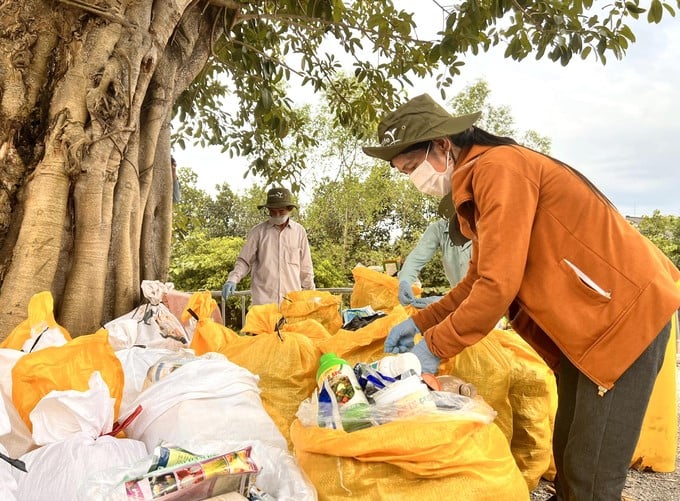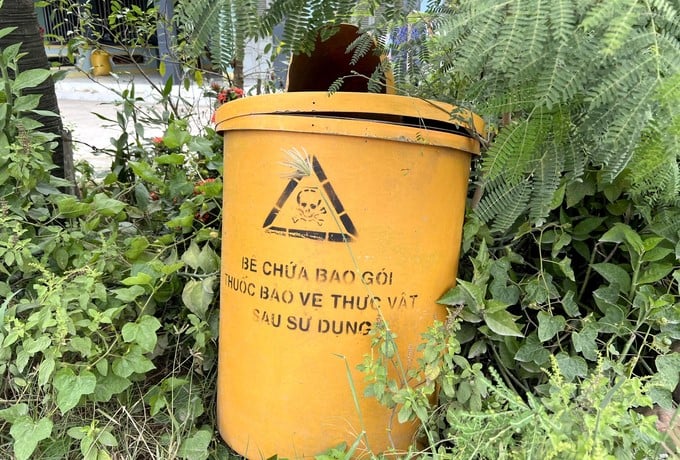June 15, 2025 | 16:36 GMT +7
June 15, 2025 | 16:36 GMT +7
Hotline: 0913.378.918
June 15, 2025 | 16:36 GMT +7
Hotline: 0913.378.918

Collecting pesticide packaging in Dong Thap province. Photo: Son Trang.
In Vietnam, since 2012, there have been many programs to collect and process pesticide packaging. Among them, the outstanding program is the "Together with Farmers to Protect the Environment" program, jointly implemented by the Plant Protection Department in coordination with the Southern Sub-Departments of Crop Production and Plant Protection, Loc Troi Group, many pesticide businesses, and the Vietnam Pesticide Association (VIPA). One of the main contents of the program is to guide farmers in handling pesticide packaging safely and effectively.
Mr. Nguyen Van Son, Chairman of VIPA, said that the "Together with Farmers to Protect the Environment" program has built 1,266 tanks to store used pesticide packaging; guided and mobilized farmers to collect more than 111,720 kg of pesticide packaging in the fields. This amount of pesticide waste is safely destroyed at the Insee Ecocycle Vietnam factory.
In 2 years, from 2020 to 2021, the program has coordinated with seven provinces and cities to install 105 more pits to store improved pesticide packaging. The Program Executive Board collaborated with Insee Ecocycle Vietnam Company to organize a packaging collection phase for model implementation sites from March 29 to April 1, 2022, and collected 5,294 kg of used pesticide packages and bottles and safely destroyed them without causing environmental pollution.
In particular, the program has supported the drafting of content and submitted it to the Ministry of Agriculture and Rural Development and the Ministry of Natural Resources and Environment to issue Joint Circular 05/2016/TTLT-BNNPTNT-BTNMT dated May 16, 2016 on "Guiding the collection, transport, and treatment of pesticide packaging after use.".
Additionally, a number of programs implemented by the Plant Protection Department in collaboration with agencies and associations (VIPA, CropLife Vietnam) in some provinces and cities are also actively contributing to the collection and treatment of pesticide packaging, such as the Program on Safe, Effective, and Responsible Use of Pesticides in Son La (2017-2020); the Program on Safe and Effective Use of Pesticides in Can Tho City (2023-2024); and the Cooperation Program on Safe and Effective Use of Pesticides in Dong Thap (2021-2026).
China is the world's largest producer of pesticides and one of the countries that uses pesticides the most. Therefore, the amount of pesticide packaging in China is very large.
Ms. Liu Jiaping, CEO of CropLife China, said that in 2023, 465,000 tons of pesticides were used in the country. The number of boxes and packaging of pesticides for crop production in 2023 is 3.4 billion (bags, packages, bottles), with an estimated total volume of 70,000–90,000 tons. Of which 51% are packaged in plastic bottles.

A tank storing used pesticide packaging in Tien Giang province. Photo: Son Trang.
The management of pesticide packaging has begun to receive attention in China since the first decade of the 21st century, especially since the implementation of phase 2 of the Sino-German Technical Cooperation Project on Pesticide Packaging Management in 2010. Since then, many programs have been deployed in many localities in China with the active participation of CropLife China and its members.
By 2017, China began to have legal regulations on recycling pesticide packaging. Specifically, the State Council has supplemented Article 37 on recycling and destroying pesticide packaging in the revised Regulation on Management of Pesticides. Some environmental laws, when amended, have also included regulations on recycling pesticide packaging.
According to CropLife International (CLI), as of now, 69 countries have reported CMS (pesticide container management system) activities in the global CropLife system. These countries come from all inhabited continents of the world.
From 2005 to 2023, 164 million tons of pesticide packaging have been collected globally. In 2023, on the whole world, the rate of pesticide packaging collected reached 66% of the total packaging put on the market (only counting 49 countries having programs with standard CMS and available data on the amount of packaging provided and the amount collected).
During the 2024-2025 period, CLI focuses on building a strategy and vision to develop CMS activities in Asia, Africa, and the Middle East to promote new advances in pesticide packaging collection.
With legal regulations, a recycling system for pesticide packaging has been established in China. By 2022, there had been 451,000 recycling points across China, including 271,000 points at pesticide stores, 150,000 points in villages, and 31,000 other points. Thanks to this, the rate of recycled pesticide packaging increased rapidly. Specifically, the recycling rate was 58.6% in 2021 and 70.4% in 2022, and then increased to 78.9% in 2023.
Translated by Thu Huyen

(VAN) The working delegation from the Ministry of Agriculture and Environment conducted an important trip to the Netherlands to strengthen strategic partnerships and sustainable development in the agricultural sector.

(VAN) The letter ‘A Plea from the Ocean’ not only evokes emotion but also awakens the human conscience to the responsibility of protecting life on Earth.

(VAN) The Department of Agriculture in South Africa has announced the country’s first mass vaccination of poultry to prevent local birds from contracting avian influenza.

(VAN) Establishment of the Mekong Delta Regional Agricultural Linkage Center, aiming for a closed value chain, deep processing, trading platforms, and international market connectivity.

(VAN) Gia Lai province has recently recorded 460 rare species of animals and plants, contributing to forest conservation and biodiversity planning in the region.

(VAN) Ms. Caroline Beresford, New Zealand Ambassador to Vietnam, expressed confidence that agricultural cooperation between Vietnam and New Zealand will develop sustainably, be climate-resilient, and promote gender equality.

(VAN) Vietnam reaffirms its commitment to international cooperation in fostering sustainable and responsible fisheries while ensuring resilient livelihoods for small-scale fishing communities.